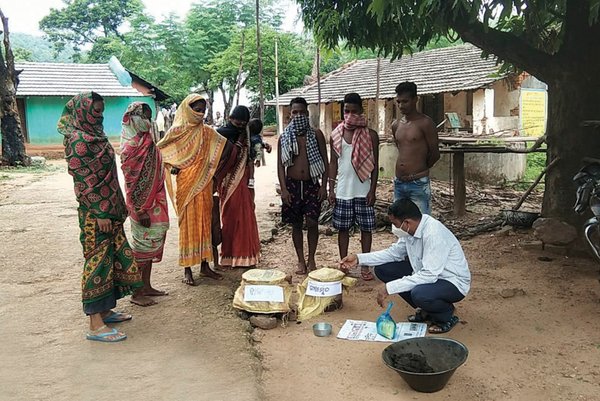 Download this article in magazine layout
Download this article in magazine layout
- Share this article
- Subscribe to our newsletter
Locally produced fertiliser instead of costly imports
For years, small-scale producers around the world have been threatened by rising fertiliser prices. In 2020 there were supply chain disruptions caused by the Covid-19 pandemic and natural disasters. This year, consequences of the Russia – Ukraine crisis exacerbated the situation. Prices surged in the beginning of the crisis because exports of fuel and fertiliser were nearly at a standstill and the production and movement of nitrogen in Eastern Europe was significantly curtailed. In more recent months, prices have dropped due to a variety of factors. In July, the United Nations brokered a 120-day agreement called the Black Sea Grain Initiative between Russia, Ukraine, and Turkey that reintroduced food and fertiliser exports. Also, in reaction to the high cost of fertiliser, farmers around the world are delaying its purchase, which is driving demand down. Nevertheless, fertiliser prices are still higher than a year ago and remain unstable due to the ongoing conflict in Ukraine and uncertainties about the legalities of conducting business with Russia. The United Nations recently warned that “the current crisis of affordability will turn into a crisis of availability”.
One way for small-scale producers to mitigate the shocks in global fertiliser markets is to use locally sourced alternatives. Supported by the International Fund for Agricultural Development (IFAD), the Odisha Particularly Vulnerable Tribal Group Empowerment and Livelihood Project (OPELIP) in Odisha, India, is encouraging producers to do just that. Odisha is one of the poorest states in India. It is also home to the largest number of particularly vulnerable tribal groups. The agriculture they practice makes use of basic farming techniques, and they rely entirely on rain to feed their crops. Malnutrition is unfortunately common in the population, especially in children, and they experience high rates of related conditions like underweight and anaemia.
OPELIP’s goal is to empower and improve the livelihoods of these vulnerable tribal groups through a variety of interventions. One of them is the use of home gardens, which involves teaching participants how to grow vegetables and fruits in gardens next to their homes. As part of this intervention, OPELIP taught farmers how to make and use two alternatives to chemical fertilisers that can be produced locally, with just a few common ingredients. One, called Jeevamruta, is an organic manure and bio-pesticide that has been in use for centuries. It is made by fermenting cow dung, cow urine, jaggery (a traditional, unrefined sugar), pulses, flour, soil and water for one week. The result is a natural source of nitrogen, potassium, phosphorus, and other micronutrients that is suitable for all crops. It also helps maintain the soil’s acidity level, improves aeration and boosts plant growth and yield.
The other, called vermicompost, takes longer than Jeevamruta to prepare, but it serves as a rich natural source of organic nitrogen, phosphorous and potassium. A wide variety of biodegradable materials can be used as ingredients, but in OPELIP’s case, participants were taught how to use a combination of food waste, water and bedding materials. Earthworms are then added to the mixture, which is processed for 40 to 50 days. The end result is a product called vermicast, which contains water-soluble nutrients ideal for plants. “Previously, beneficiaries were cultivating in a traditional way, and they left the fields alone. Now, we are teaching them how to get more crop by applying Jeevamruta, Nimastra, and other organic pesticides for better yield and soil fertility,” an OPELIP agricultural officer explains. “Equipped with the right knowledge and practical experience, households from these tribal groups are now increasing their ability to cultivate fruits and vegetables for household consumption, improving their nutritional intake and creating income-generating opportunities through the sale of surplus crops.”
With fertiliser from Russia, Ukraine and Belarus accounting for about ten per cent of India’s total fertiliser imports, prices across the country are expected to increase for the foreseeable future. But when small-scale producers are able to rely on their own knowledge and resources to produce alternatives, they are better equipped to both face short-term shocks like rising prices and build sustainable, resilient food systems over the long term.
Thea Ritter and Jonathan Mockshell are agricultural economists at the Alliance of Bioversity International and the International Center for Tropical Agriculture (CIAT). Tisorn Songsermsawas is an economist with IFAD’s Research and Impact Assessment Division.
Contact: t.ritter(at)cgiar.org
The research is part of the “Linking Research to Impact: Increasing the effectiveness of agriculture and food systems in improving nutrition” project funded by IFAD and the CGIAR initiative on National Policies and Strategies for Food, Land and Water Systems Transformation (NPS).




